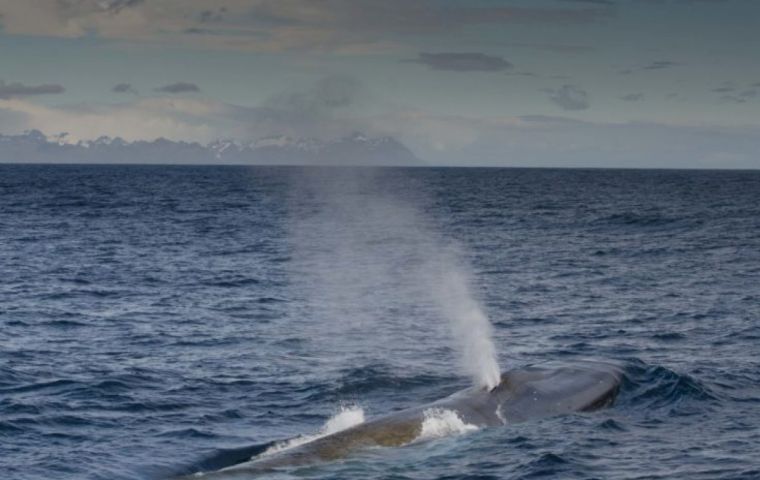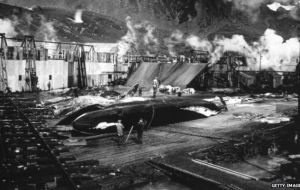MercoPress. South Atlantic News Agency
South Georgia is evidence of whales recovery, a century after they were heavily exploited
 South Georgia is a key summer feeding ground for a number of whale species, but the whaling industry nearly wiped them out, killing over 176,000 in sixty years.
South Georgia is a key summer feeding ground for a number of whale species, but the whaling industry nearly wiped them out, killing over 176,000 in sixty years. A team led by the British Antarctic Survey has just returned from the sub-Antarctic island of South Georgia, as the last of three expeditions to investigate the recovery of whales a century after they were heavily exploited. After 30 years of protection, large numbers of whales appear to be returning to the region.
South Georgia is a key summer feeding ground for a number of whale species, but the whaling industry on the island nearly wiped them out, killing over 176,000 in sixty years.
Preliminary results from the expeditions found that humpback whales are now a very common sight in coastal waters, with 790 humpback whales sighted during 21 days of survey. High densities of humpback whales were seen in 2019 and 2020, with preliminary estimates of abundance indicating that over 20,000 whales now seasonally feed in these waters. This estimate is very similar to recent abundance estimates obtained from their associated winter breeding ground in Brazil (humpbacks migrate between Brazil in winter and high latitude feeding grounds in summer). Since Brazilian humpback whales were recently found to be very close to full recovery, similar abundances on the South Georgia feeding ground suggest that South Georgia is one of the most important feeding grounds for humpbacks in the Southwest Atlantic, and that they are now very close to full recovery on this former whaling ground.
The largest animals on earth, the critically endangered Antarctic blue whales were detected acoustically and sighted once during the 2018 survey of South Georgia, but during the 2020 survey were sighted 36 times, with 55 animals seen. For such a rare species, this is an unprecedented number of sightings and suggests that South Georgia waters remain an important summer feeding ground for this rare and poorly known species.
Whale project leader Dr Jennifer Jackson, a whale ecologist at BAS, says:
“After three years of surveys, we are thrilled to see so many whales visiting South Georgia to feed again. This is a place where both whaling and sealing were carried out extensively. It is clear that protection from whaling has worked, with humpback whales now seen at densities similar to those a century earlier, when whaling first began at South Georgia.”
The research team were also able to satellite tag two rare southern right whales in South Georgia this season, and are now studying their movements in order to find out what feeding areas are important for them in the summer and autumn.
Southern right whales are slowly recovering from whaling in the southwest Atlantic. They were regularly seen in South Georgia waters during the 2018 survey, but were only rarely sighted during the 2019 and 2020 surveys, suggesting that they preferred to feed elsewhere during these years. Researchers are now studying data collected from this voyage to better understand what right whales feed on in South Georgia waters.
When Antarctic explorer and whaler Carl Larsen first visited South Georgia, he was so impressed by the densities of whales there, he said “I see them in hundreds and thousands”, applying immediately for a license to open a whaling station there. From 1904 onwards, multiple whaling stations operated along the coast of South Georgia, killing humpback whales close to the coast first (1904-1920), then blue and fin whales further offshore (1920-1945), and finally the less profitable sei whales (1945-1965). Subsequently, whales were scarcely seen for about 30 years. In the 1990s reports of whale sightings began to rise, and the South Georgia museum have been compiling records of sightings since that time.
The wild water whales project has been running since December 2016, and focuses on studying the population recovery and health of southern right whales in South Georgia waters, conducting sightings surveys, using acoustics to find whales, collecting photo-identifications and skin samples to identify individuals, tracking whales to find out where they feed, and studying the health condition of right whales using drone technology.
Led by the British Antarctic Survey, the project has been funded by the Darwin Initiative, EU BEST, South Georgia Heritage Trust, Friends of South Georgia Island and the World Wildlife Fund, and involves over 40 whale researchers from nine different countries. The project is led by two women, Principal Investigator Dr Jen Jackson from the British Antarctic Survey with support from Co-Investigator Dr Emma Carroll from the University of Auckland, New Zealand. Field team leader Dr Amy Kennedy from the University of Washington, USA, has overseen the last two years of expeditions.
This year’s expedition took place on the RV Braveheart and was dedicated to the memory of the late Prof Peter Best, an English marine biologist who pioneered whale study in South African waters.
This international project includes scientists from University of Auckland, Sea Mammal Research Institute, the University of Washington, the Woods Hole Oceanographic Institution, Instituto Aqualie, Federal University of Juiz de Fora, Projeto Baleia Franca, University of St Andrews, Wildscope, Oregon State University, US NOAA, the University of Rio Grande do Norte, the Australian Antarctic Division, the University of Pretoria and the Scottish Association of Marine Sciences and the University of Barcelona.
Key collaborators involved in the project include the University of Auckland (conducting the genetic work), Instituto Aqualie (collaborating on whale tracking), Woods Hole Oceanographic Institute (studying whale health), the Sea Mammal Research Unit (acoustic analysis and health), the University of Barcelona (analyzing the historical catch record), Wildscope (analyzing whale abundance) and Happywhale, a citizen science based initiative who publish and share photo-identifications of whales online. (BAS)





Top Comments
Disclaimer & comment rulesCommenting for this story is now closed.
If you have a Facebook account, become a fan and comment on our Facebook Page!